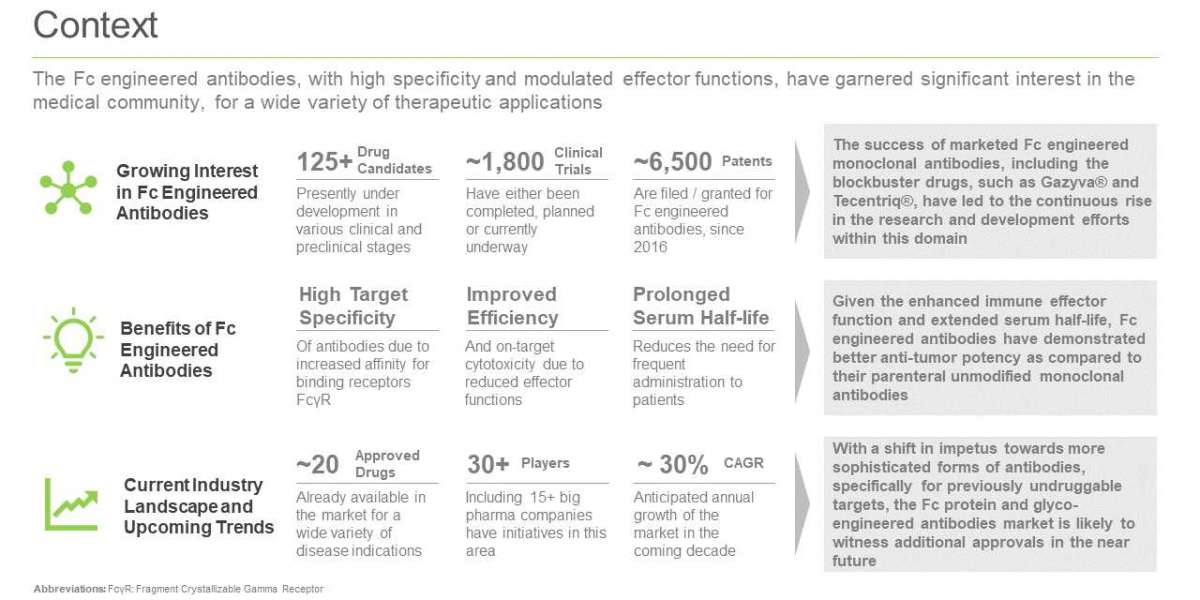Roots Analysis has announced the addition of Fc Protein and Glyco-engineered Antibodies Market report to its list of offerings.
Overview -
Antibodies, also known as immunoglobulins, are Y-shaped glycoproteins that are produced by the immune system in response to foreign molecules (antigens) that enter the body.[1] The term antigen refers to any substance that is capable of inducing an immune response; examples include viruses, fungi, bacteria, proteins on the surface of cells, and non-living substances, such as toxins, chemicals and foreign particles. Once developed, these antibodies can protect an individual from getting affected after re-infection by a certain pathogen.
To request a sample copy / brochure of this report, please visit this – https://www.rootsanalysis.com/reports/fc-protein-engineered-and-glycoengineered-antibodies-market/request-sample.html
The Fc region of an antibody interacts with the Fc receptors and a few proteins of the complement system enabling the antibodies to activate the immune system. Advances in biotechnology have enabled researchers to alter the above-mentioned functions of the Fc region of an antibody in order to direct specific functions for use in various applications. For instance, the ADCC mechanism can be enhanced to improve antibody-mediated tumor cell killing. This can be achieved by increasing the binding strength between the Fc region of the antibody and the FcγR. It is possible to achieve such modifications through the introduction of site directed mutations in the contact residues or through the ablation of fucosylation of the Fc region.
This research on the interaction between Fc region and Fc receptors has paved a new potential for the design of next generation therapeutic antibodies. Activation of phagocytosis, also called ADCP, is the most common function of the Fc receptors, along with ADCC and CDC.
- ADCC: The mechanism of cell mediated immunity where the effector cells effectively disintegrate a target cell that has been fastened by specific antibodies. It is mediated through interaction of Fc region with Fc receptors, aiding the cells to recognize and eliminate the pathogens. The Fc receptors are present on monocytes, granulocytes and lymphocytes. It is one of the mechanisms by which antibodies, as part of the humoral immune response, can restrict and refrain infection.
- CDC: The mechanism of antibody mediated immunity where the interaction of Fc region with the complement component C1q activates the classical complement activation cascade. This leads to formation of the membrane attack complex, the cytolytic end product of the complement cascade.
- Glycoengineering
Glycoengineering involves the improvement of the properties of proteins, such as stability, solubility and decreasing immunogenicity. Subsequently to this, the efficacy of Therapeutic proteins can be increased. Variation in the glycoforms present in the Fc domain and glycosylation itself is known to improve the effector functions of an IgG molecule. Several studies have been carried out to understand the effect of oligosaccharide alterations on the Ig effector functions.[2] Additionally, glycosylation increases the solubility of molecules. Inappropriate glycosylation or its absence affects the rate at which antibodies are cleared from the serum and decreases the efficiency of interaction between antibody and other proteins with which it interacts. Glycosylation is the most common post-translational modification and has been found to play a role in the following activities:
- Effector functions, including ADCC, CDC or ADCP
- Immunogenicity
- Plasma clearance
- Resistance towards proteases
- Protein Engineering
Fc region can be engineered through introduction of amino acid substitutions. This is referred to as protein engineering. These substitutions can be introduced through both direct and random mutagenesis. Some companies have developed patented Fc protein engineering technologies, using which they have developed several Fc variants. some variants that show increased affinity to FcRn and hence increased half-life, have been developed through amino acid substitutions.[3] Notable examples of such technologies include:
- Fc Optimization platform - MacroGenics
- Fc Xtend Technology - Xencor
- MABNEXT platform - BIOCAD
- Isotype Chimerism
Isotype chimerism is an Fc engineering technique where a part of IgG3 amino acid sequence is introduced into the corresponding region of IgG1. The process combines the advantages of IgG1 and IgG3. Isotype chimerism helps increase the CDC activity and several stakeholders in the industry have developed proprietary technologies that facilitate isotype chimerism. For instance, Kyowa Kirin, has developed a patented isotype chimerism technology called COMPLEGENT® which enhances CDC activity by more than ten folds by Fc chimerism between IgG1 and IgG3.[4]
These underpinning structure-function relationships and unique Fc engineering technologies have driven decades-long research to develop antibodies with augmented properties to conventional antibodies to treat cancer and has delivered salient proof-of-concept that Fc engineered antibodies can evoke patient benefits.
There are several successful Fc-engineering monoclonal antibodies, such as atezolizumab, durvalumab, eculizumab, margetuximab, obinutuzumab and ravulizumab, which are currently available for the treatment of several disease indications; moreover, there are many others under evaluation. Given the wide applicability of antibodies, medical researchers and therapy developers are strongly motivated to continue innovating in this field.
For additional details, please visit - https://www.rootsanalysis.com/reports/fc-protein-engineered-and-glycoengineered-antibodies-market.html Or sales@rootsanalysis.com
About Roots Analysis
Roots Analysis is one of the fastest growing market research companies, sharing fresh and independent perspectives in the bio-pharmaceutical industry. The in-depth research, analysis and insights are driven by an experienced leadership team which has gained many years of significant experience in this sector. If you’d like help with your growing business needs, get in touch at info@rootsanalysis.com
Contact Details
Ben Johnson
+1 (415) 800 3415
ben.johnson@rootsanalysis.com
Roots Analysis
Web: https://www.rootsanalysis.com/
LinkedIn: https://in.linkedin.com/company/roots-analysis
Twitter: https://twitter.com/RootsAnalysis.com
Medium: https://medium.com/@RootsAnalysis
Pinterest: https://in.pinterest.com/RootsanalysisPin/_saved/



